Overview
In today’s competitive digital landscape, many tech startups struggle to enhance their online visibility and attract potential customers. This challenge can feel overwhelming, as the pressure to stand out grows. However, there is hope. By implementing effective SEO strategies, you can navigate these waters with confidence.
To support you on this journey, we outline five essential steps that can make a significant difference:
- Understanding the basics of SEO is crucial; it lays the foundation for everything that follows.
- Conducting thorough keyword research helps you identify what your potential customers are searching for, allowing you to connect with them more effectively.
- Optimizing your website content is the third step, ensuring that your messages resonate with your audience and meet their needs.
- Implementing technical SEO best practices can enhance your site’s performance, making it easier for search engines to find and rank you.
- Monitoring your SEO performance is vital; it allows you to adjust your strategies based on what works best, ensuring sustained growth.
Remember, you’re not alone in this process. Many founders share similar experiences, and by following these steps, you can create a strong online presence that attracts the customers you deserve. Together, we can foster a thriving community of tech startups that support each other in achieving success.
Introduction
In the competitive landscape of tech startups, many founders struggle with establishing a robust online presence, which is crucial for attracting and retaining customers. This challenge can feel daunting, as the digital world is constantly evolving, and without visibility, even the best solutions can go unnoticed.
Search Engine Optimization (SEO) emerges as a vital tool in this journey, enabling businesses to enhance their visibility in search engine results and connect with potential clients actively seeking their solutions.
This comprehensive guide delves into the essential components of SEO, from understanding its fundamentals to executing effective keyword research and optimizing website content. By embracing these strategies, startups can navigate the complexities of the digital world, ensuring their offerings are not only visible but also compelling to their target audience.
Remember, mastering SEO is not just an option; it is a necessity for sustainable growth and success. Together, we can explore these strategies and empower your startup to thrive in the digital marketplace.
Understand SEO Basics for Your Startup
SEO, or Search Engine Optimization, is the practice of using strategies to seo your site and improve its visibility in search engine results. For tech startups, knowing how to SEO your site is not just important; it's vital. It helps attract potential customers who are actively searching for the solutions you offer.
Many startups struggle with visibility, and this can be disheartening. Imagine pouring your heart and soul into your product, only to find that potential customers can't discover you. This is where SEO comes into play, offering a lifeline. Key components of SEO include:
- On-Page SEO: This involves optimizing individual pages on your website to rank higher and earn more relevant traffic. Essential components consist of title tags, meta descriptions, and content quality.
- Off-Page SEO: This pertains to activities conducted outside of your own site to influence your rankings within search engine results pages. This includes link building and social media marketing.
- Technical SEO: This focuses on improving more complex aspects of your website, such as site speed, mobile-friendliness, and indexing. With more than 55% of American households anticipated to possess at least one smart speaker, optimizing for voice queries is becoming increasingly crucial. Over 20% of inquiries on the Google App are performed through voice, and 2 out of 5 adults utilize voice queries at least once daily. This signals a significant change in user behavior that startups must adjust to.
Understanding these elements offers a strong foundation for executing effective SEO strategies tailored to your startup's unique requirements. Furthermore, with 91% of pages never receiving organic traffic, tech startups face a daunting challenge in gaining visibility. This highlights the necessity of prioritizing how to SEO your site to ensure that your content is not only visible but also accessible to your target audience. As the digital landscape evolves, incorporating successful strategies to seo your site will enhance your online presence and drive sustainable growth for your startup.
As noted by Omnicore Agency, the number of daily video views on Facebook exceeds 8 billion, underscoring the importance of digital visibility in today's market. Remember, you are not alone in this journey; many others share your challenges, and together, we can navigate the path to success.
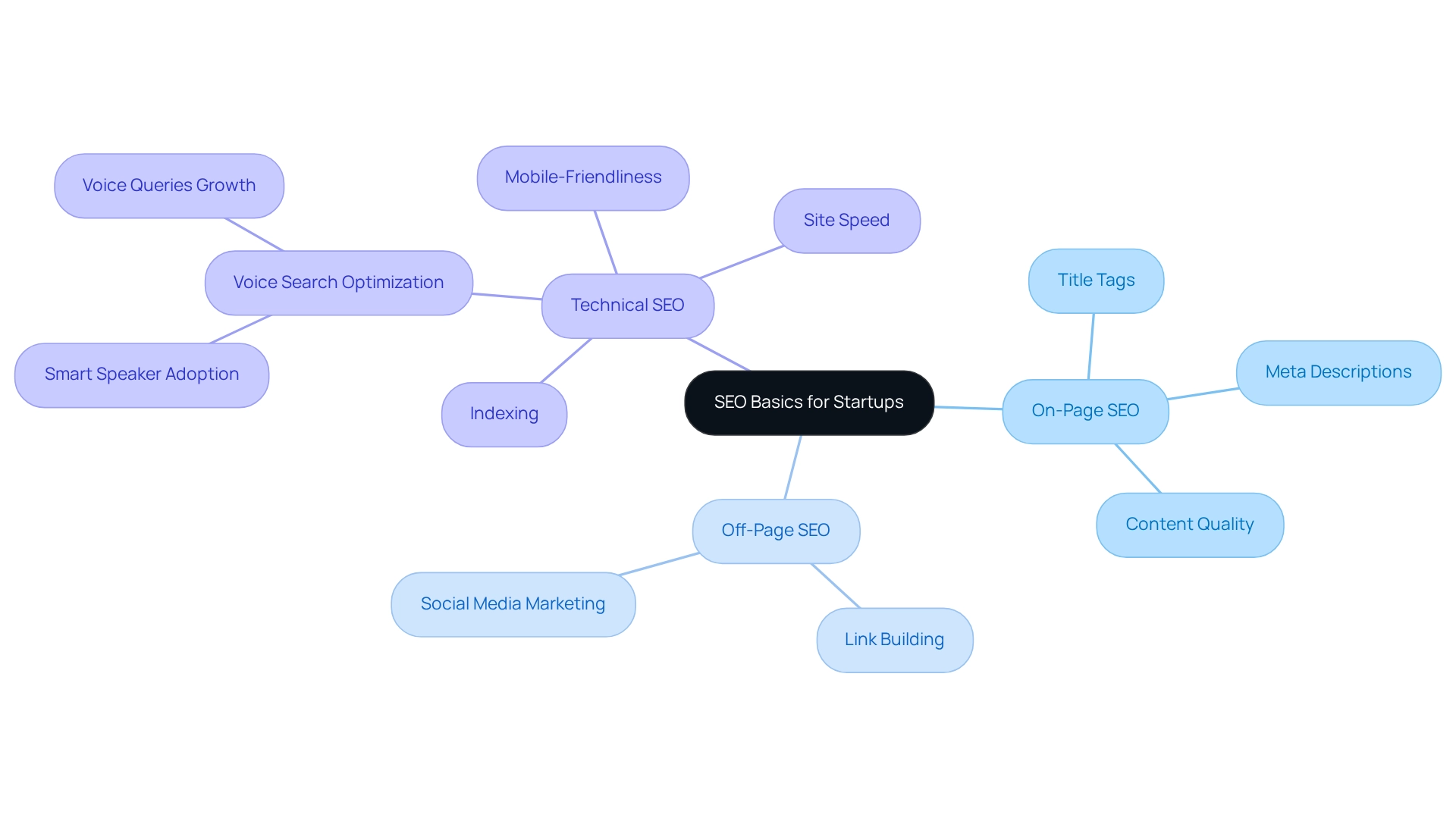
Conduct Effective Keyword Research
To conduct effective keyword research, it's essential to approach it with care and understanding. Many startup founders struggle to identify the right keywords that resonate with their audience, which can feel overwhelming. But don't worry; by following these steps, you can navigate this process with confidence.
-
Identify Your Niche: Start by clearly defining your startup's unique value proposition and the specific problems you address for your customers. Understanding your niche is crucial for targeting the right audience and can make a significant difference in your success.
-
Use Keyword Research Tools: Utilize tools such as Google Keyword Planner, Ahrefs, or SEMrush to discover keywords pertinent to your niche. Aim for keywords that strike a balance between volume and competition, as this will maximize your visibility. Remember, organic inquiry is the second most important source of website traffic, accounting for 29% of all visits. This makes effective keyword research essential.
-
Analyze Competitors: Investigate the keywords your competitors are ranking for. This analysis can reveal valuable keywords you might have missed and help you refine your strategy.
-
Focus on Long-Tail Keywords: Prioritize longer, more specific phrases that typically exhibit lower competition and higher conversion rates. For instance, instead of targeting a broad term like 'software', consider opting for 'best project management software for startups'. This approach aligns with the trend where 13 million adults in the U.S. now use generative AI for online searches, indicating a shift towards more specific queries. Additionally, think about how captivating material, such as GBP posts featuring emojis, can enhance click-through rates and conversions.
-
Evaluate Search Intent: Ensure that the keywords you select resonate with what your target audience is actively searching for. Classify these intents into informational, navigational, and transactional categories to better align your material with user needs. Incorporating video marketing strategies can also complement your keyword efforts, as 87% of marketers report that video marketing has helped increase sales and reduce support queries.
By implementing these strategies, you can seo your site to develop a robust keyword framework that effectively drives targeted traffic to your site, enhancing your startup's online presence and engagement. Stay informed about the top trending keywords, such as 'Moria Mills' and 'US politics', to keep your material relevant and timely. Remember, you are not alone in this journey; many have faced similar challenges, and with the right approach, you can achieve your goals.
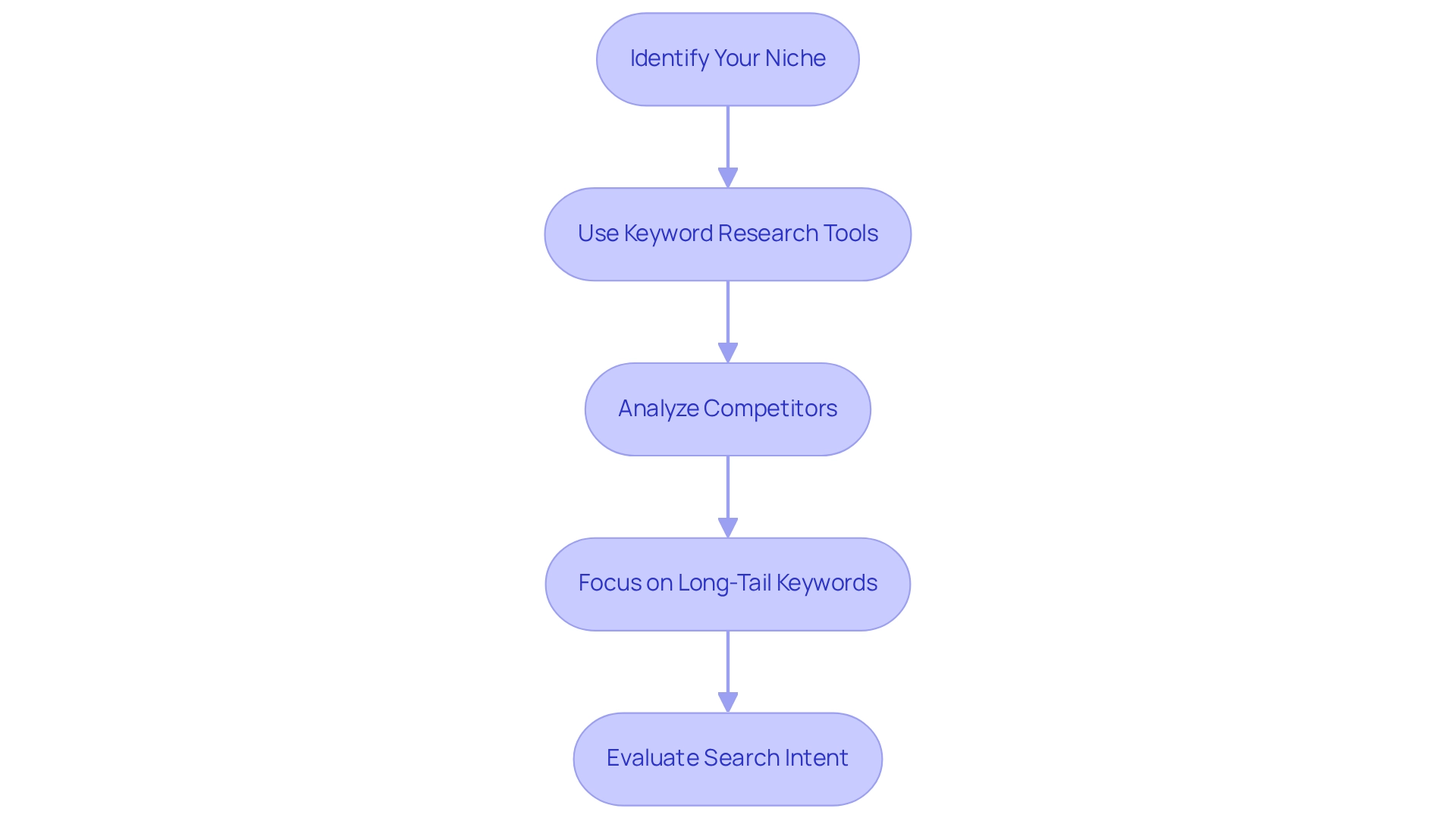
Optimize Your Website Content for SEO
To effectively seo your site and optimize your website content for SEO, let's explore some essential steps that can truly make a difference for your tech startup.
- Create High-Quality Material: It's vital to prioritize the development of valuable, informative, and engaging content that meets your audience's needs. Using clear and concise language is key to maintaining reader interest and enhancing comprehension. Think about your audience—what do they truly want to know?
- Incorporate Keywords Naturally: Strategically integrating identified keywords throughout your content, including headings, subheadings, and body text, is crucial. However, be mindful to avoid keyword stuffing, as this can negatively impact both your rankings and user experience. Remember, authenticity resonates more than forced repetition.
- Optimize Meta Tags: Crafting compelling title tags and meta descriptions that incorporate relevant keywords can draw clicks from search results. It's interesting to note that 60% of URLs in the top 10 results on Google are three years old or older, underscoring the importance of providing new, optimized material.
- Utilize Header Tags: Arranging your content with header tags (H1, H2, H3) not only improves readability but also helps web crawlers understand the layout of your content. This practice enhances user experience and supports your SEO performance. Consider how your readers navigate your content and guide them gently.
- Include Internal and External Links: Incorporating links to other pertinent pages on your platform (internal links) and credible external sources can significantly improve user satisfaction. This approach strengthens your site's credibility, leading to better visibility in rankings. Sharing resources can create a sense of community and trust.
- Optimize Images: Using descriptive file names and alt text for images enhances accessibility and aids search engines in understanding the purpose of your images. This is especially crucial as 2 out of 5 adults utilize voice technology at least once daily, with usage anticipated to increase among Gen Z by 2027. Image optimization is becoming progressively significant.
By implementing these strategies, you can significantly enhance your website's SEO performance to effectively seo your site, ensuring that your tech startup stands out in a competitive digital landscape. High-quality material remains a cornerstone of effective SEO, as evidenced by successful case studies like Google, which processes 70,000 inquiries annually and adjusts to algorithm changes 500-600 times a year. As Sherrie Gossett, a Small Business Consultant, wisely notes, "Uncovering hidden trends and opportunities is crucial for success in SEO." Emphasizing quality and relevance in your content will not only improve your rankings but also foster lasting engagement with your audience. Together, we can navigate this journey toward success.
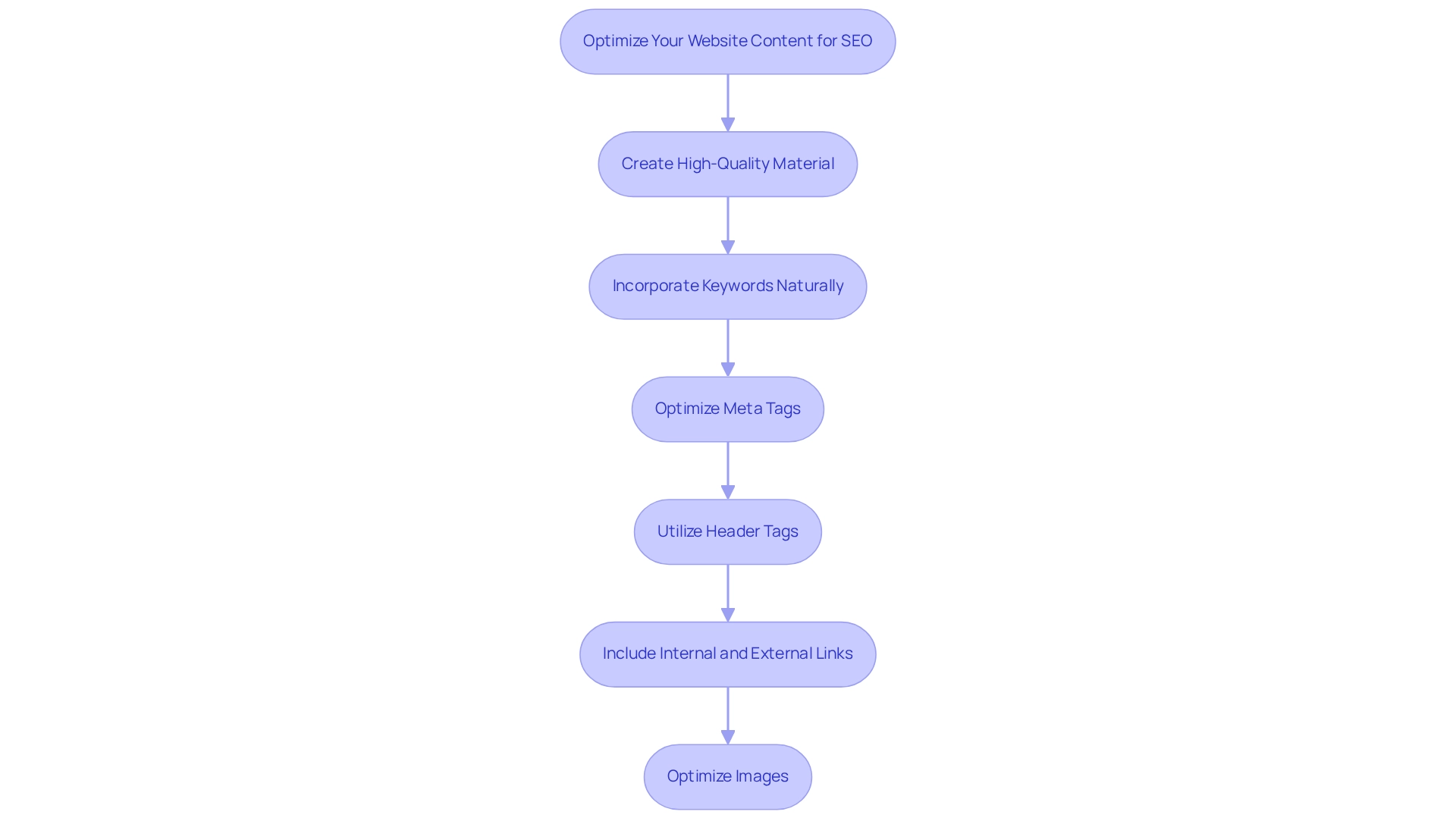
Implement Technical SEO Best Practices
To effectively implement technical SEO best practices, it’s important to acknowledge the challenges that many tech startup founders face in this area. A common concern is how to ensure your website performs optimally, as this can significantly affect your business's success and help SEO your site. Utilizing tools like Google PageSpeed Insights can help you assess and enhance your website's loading speed. Fast-loading webpages not only create a better experience for users but also play a crucial role in improving search rankings. It’s concerning to note that 64% of online shoppers will abandon a platform due to poor user experience. This statistic underscores the critical nature of loading speed. Moreover, shoppers visit an average of 8.9 pages when load time is 2 seconds, compared to just 3.3 pages when it stretches to 8 seconds. This highlights the direct impact of load times on user engagement and retention.
-
Ensure Mobile-Friendliness: With mobile device usage on the rise, confirming that your platform is responsive is essential. A seamless experience across all devices is vital for keeping your visitors engaged and satisfied.
-
Create an XML Sitemap: An XML sitemap can be a helpful tool, assisting web crawlers in understanding your platform's structure and finding all pages. Submitting your sitemap to Google Search Console is a vital step in enhancing your platform's discoverability.
-
Optimize URL Structure: It’s also important to craft clean, descriptive URLs that incorporate relevant keywords. Avoid long, complicated URLs that can confuse both users and indexing systems.
-
Implement HTTPS: Securing your platform with HTTPS not only protects user data but also builds trust. This trust can positively influence your rankings, making it a crucial step.
-
Fix Crawl Errors: Regularly monitoring Google Search Console for crawl errors and addressing any issues promptly is essential. Ensuring that search engines can reach your content is key to maintaining visibility.
-
Consider Minification and Script Compression: Techniques such as minification, which involves removing unnecessary characters from code, can significantly reduce file sizes and improve loading times. Utilizing compression techniques like GZip can further enhance website efficiency by optimizing code, which is crucial to SEO your site and can greatly boost your platform's visibility and performance in search results. This is not just about numbers; it’s about fostering growth for your tech startup in a competitive landscape. The increasing importance of website load time statistics highlights the urgency of these practices, and I encourage you to take these steps to ensure your success.
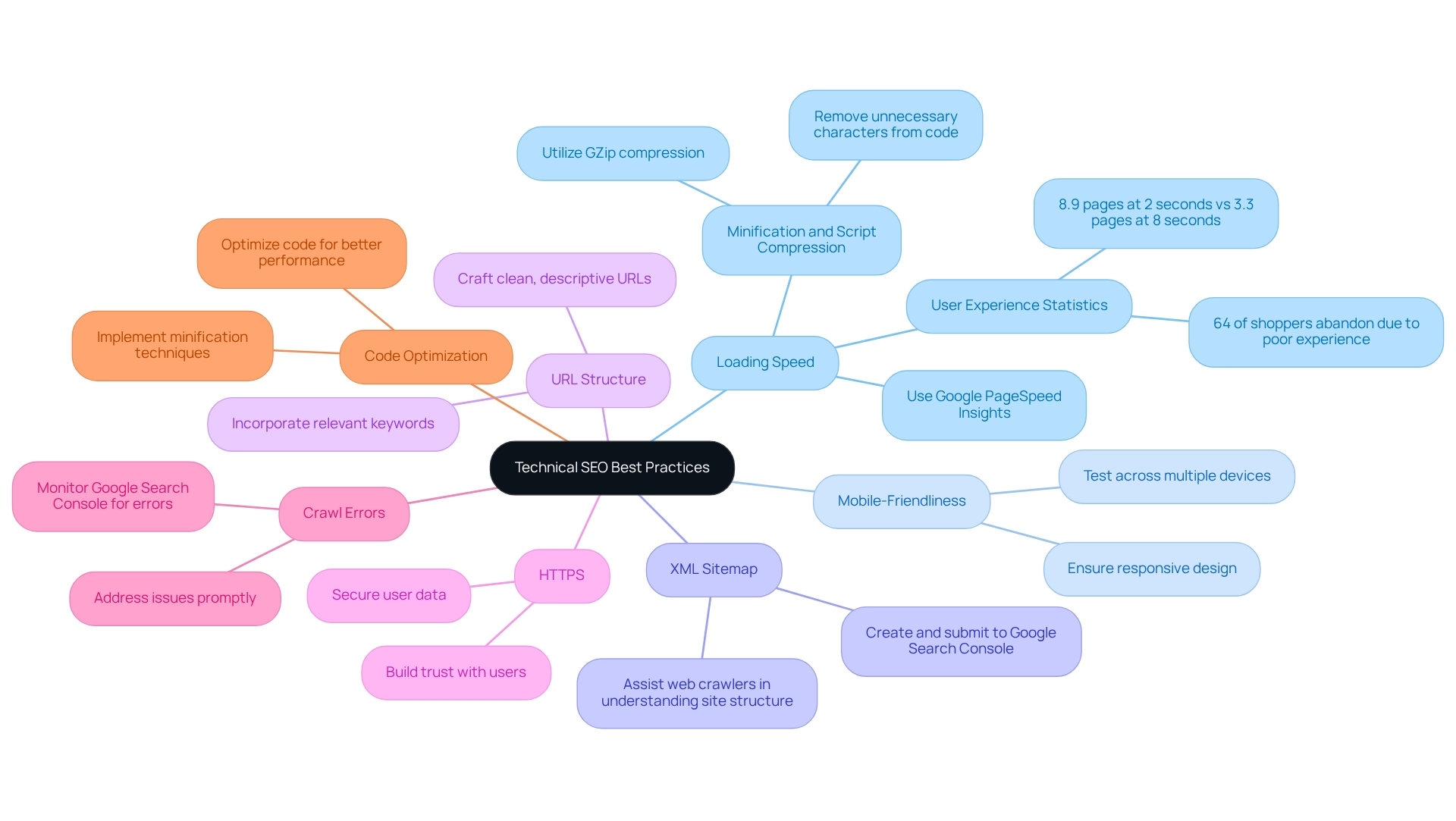
Monitor and Analyze Your SEO Performance
To effectively monitor and analyze your SEO performance, it’s important to recognize the challenges you may face when you SEO your site. Many startup founders struggle with understanding how their efforts translate into tangible results, which can lead to frustration and uncertainty.
-
Set Up Google Analytics: Implementing Google Analytics can be a game-changer for tracking website traffic, user behavior, and conversion rates. With 317,448 locations in the UK utilizing GA4, this tool provides crucial insights into user interactions, helping you enhance the overall user experience.
-
Utilize Google Search Console: By leveraging Google Search Console, you can keep an eye on your webpage's performance in search results, including impressions, clicks, and average keyword positions. This tool is instrumental in identifying both issues and opportunities for improvement, ensuring you stay ahead in the competitive landscape.
-
Track Key Metrics: It’s essential to concentrate on critical metrics such as organic traffic, bounce rate, average session duration, and conversion rates. These indicators will help you assess the effectiveness of your SEO efforts and guide you in how to SEO your site, empowering you to make informed decisions.
-
Conduct Regular Audits: Regularly performing SEO audits can pinpoint areas needing enhancement, such as technical issues, content gaps, and backlink profiles. This proactive approach is vital to SEO your site and maintain its competitiveness in search rankings. The growth of the Analytics as a Service market underscores the increasing importance of analytics tools for online creators and businesses.
-
Adjust Strategies Based on Data: Utilize insights from your analysis to refine your SEO strategies. Experimenting with various approaches while closely monitoring their impact will ensure continuous improvement. As noted by Search Engine Journal, 17% of SEOs who earn over $200,000 have 20+ years of experience, highlighting the value of experienced SEO practices. By consistently monitoring and analyzing how to SEO your site, you can adapt your strategies to align with your startup's goals. This ultimately drives growth and enhances your digital presence. Remember, the focus on providing value and cultivating relationships is key in your overall digital marketing strategy. Together, we can navigate these challenges and thrive in the digital landscape.
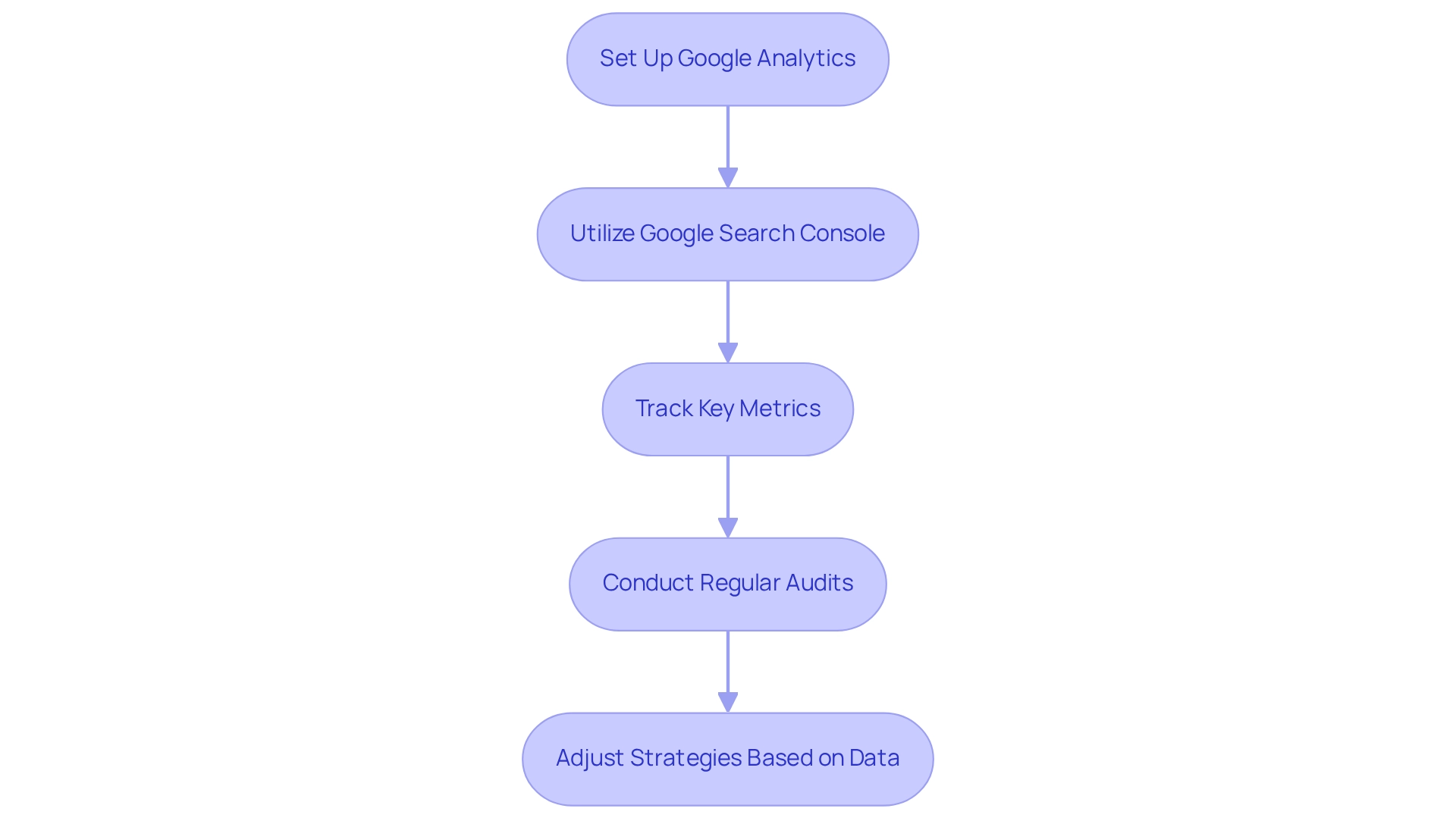
Conclusion
Establishing a strong online presence through effective SEO strategies can feel overwhelming for tech startups striving to thrive in a competitive digital landscape. Many founders grapple with the intricacies of SEO, and it’s easy to feel lost amid the technical jargon. However, by understanding the fundamentals of SEO—on-page, off-page, and technical aspects—startups can significantly enhance their visibility and attract potential customers who are actively seeking their solutions. Conducting thorough keyword research and optimizing website content not only drives targeted traffic but also fosters engagement with the audience, creating a meaningful connection.
Moreover, implementing technical SEO best practices is essential. It ensures that websites are fast, mobile-friendly, and easily navigable for both users and search engines. Regularly monitoring and analyzing SEO performance through tools like Google Analytics and Google Search Console allows startups to adapt their strategies based on data-driven insights. This ongoing process is crucial for maintaining competitiveness and achieving sustainable growth, which can feel like a daunting task, but it’s a journey worth taking.
Ultimately, mastering SEO is not merely an option but a necessity for startups looking to establish themselves in the digital marketplace. By committing to these strategies, tech startups can unlock their full potential, ensuring their offerings are not just visible but also compelling to their target audience. In this ever-evolving digital world, investing in SEO will pave the way for long-term success and resilience in the marketplace. Remember, you’re not alone on this journey; by embracing these strategies, you’re taking a significant step toward realizing your vision.
Frequently Asked Questions
What is SEO and why is it important for tech startups?
SEO, or Search Engine Optimization, is the practice of using strategies to improve a website's visibility in search engine results. For tech startups, SEO is vital as it helps attract potential customers actively searching for the solutions they offer.
What are the key components of SEO?
The key components of SEO include: - On-Page SEO: Optimizing individual pages on your website for higher rankings and relevant traffic, focusing on title tags, meta descriptions, and content quality. - Off-Page SEO: Activities outside your site that influence rankings, such as link building and social media marketing. - Technical SEO: Improving complex aspects of your website, including site speed, mobile-friendliness, and indexing.
How has user behavior changed regarding search queries?
With more than 55% of American households expected to have at least one smart speaker, optimizing for voice queries is increasingly important. Over 20% of inquiries on the Google App are made through voice, and 2 out of 5 adults use voice queries daily.
What challenges do tech startups face regarding visibility?
Tech startups face significant challenges in gaining visibility, with 91% of pages never receiving organic traffic. This highlights the necessity of prioritizing SEO to ensure content is visible and accessible to the target audience.
What are some steps for effective keyword research?
Effective keyword research involves: 1. Identifying your niche and unique value proposition. 2. Using keyword research tools like Google Keyword Planner or SEMrush to find relevant keywords. 3. Analyzing competitors to discover valuable keywords. 4. Focusing on long-tail keywords that are more specific and typically have lower competition. 5. Evaluating search intent to ensure keywords align with what your audience is searching for.
How can startups enhance their online presence through SEO?
By implementing effective SEO strategies tailored to their unique requirements, startups can improve their online visibility, drive targeted traffic, and enhance engagement, ultimately leading to sustainable growth.




